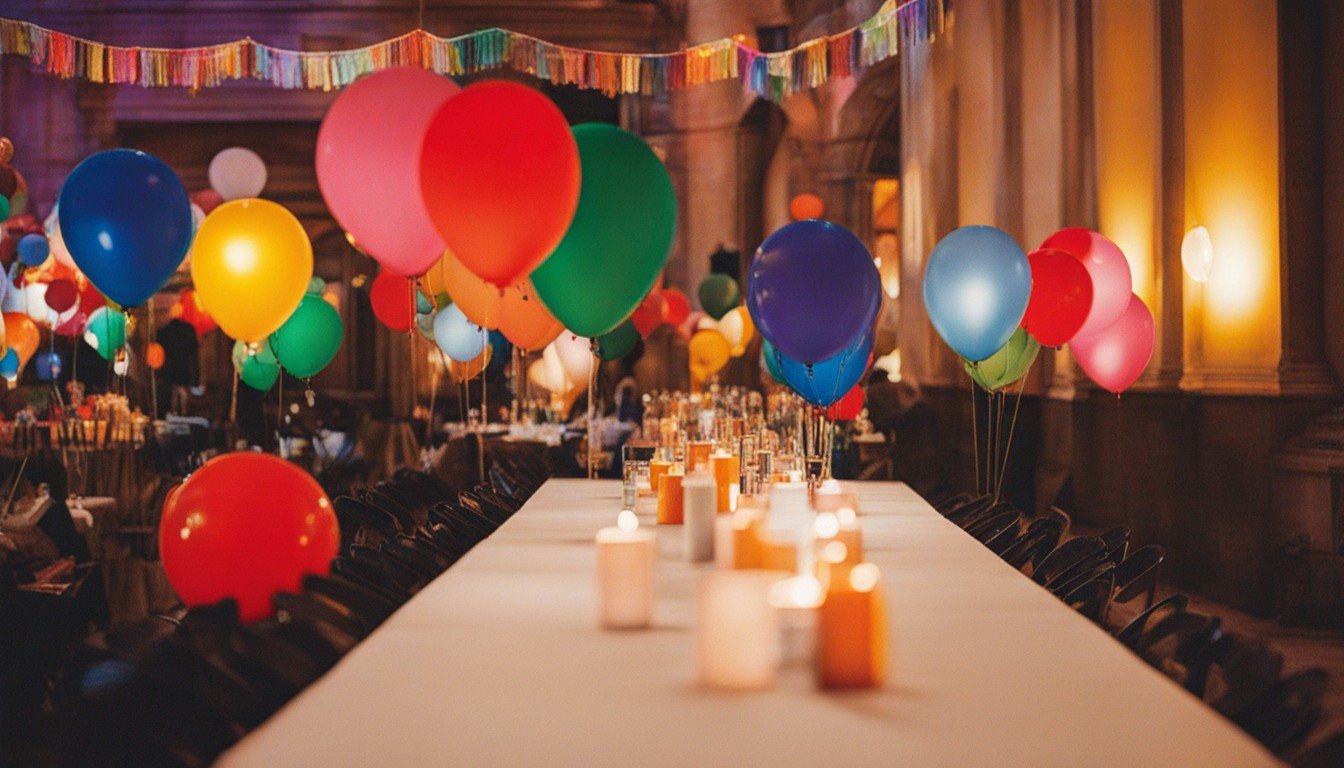The intriguing phrase “all tomorrow’s parties” has graced many album titles, books, and works of art over the years. But what exactly does this evocative wording mean?
While open to interpretation, “all tomorrow’s parties” generally conveys ideas of living in the moment, nostalgia for the past, apprehension about the future, the relentless march of time, and the feeling that the best days may be behind us.
Let’s explore the possible symbolic significance behind this memorable line and how it has captured the imagination of artists and writers for generations.
Origins and Early Usage
The phrase “all tomorrow’s parties” dates back to at least the 19th century, though its exact origin is unclear. Some of the earliest known uses include:
- The line appeared in Irish poet Oscar Wilde’s acclaimed novel The Picture of Dorian Gray published in 1890. In one passage, the hedonistic protagonist Lord Henry Wotton quips, “Let us go to the theatre tonight […] and sup afterwards at the Carlton. There are only leftovers to be had from the summer parties. However, I love all tomorrow’s parties…”
- American novelist John Dos Passos titled a chapter “All Tomorrow’s Parties” in his seminal modernist work Manhattan Transfer from 1925, which paints a stark portrait of New York City life.
- Poet Laurette John Masefield’s poem “The West Wind”, also published in the 1920s, includes the line “It’s later than you think, nearer than you dream, the past is over, the future’s clean, gone is the party, last night’s pretend, all emptied and over, all that you lend…all tomorrow’s parties…”
These early examples evoke fleeting pleasure, futility, regret, and the unstoppable passage of time. But the phrase exploded into popular culture in the mid 20th century.
Pop Culture Usage in the 1960s
In the 1960s, “all tomorrow’s parties” took on new resonance in popular music and avant garde circles. Key usages include:
- American singer-songwriter Andy Warhol used it to title a 1966 film exhibition featuring performances by The Velvet Underground, Nico, and other underground groups staged at his studio The Factory.
- British rock band The Kinks’ released their hit track “All Tomorrow’s Parties” in 1967 featuring the hook “All tomorrow’s parties where have you been/If you never come again what will I do at my party?” lamenting fleeting youth.
- Iconic American author William S. Burroughs titled his experimental 1960 novel The Soft Machine “All Tomorrow’s Parties” in its original serialization before changing the name at publication.
For counter-culture and anti-establishment movements coming of age in the 60s, “all tomorrow’s parties” captured their sense of disillusionment and desire to live fully in the present. The line became linked to excess, rebellion, and anti-consumerism.
Literary Usage
Beyond its musical connections, “all tomorrow’s parties” continued to resonate powerfully in literature over the decades. Examples include:
- Ray Bradbury’s 1962 novel Something Wicked This Way Comes. The carnival ringmaster character says ominously, “For most of us, the past is a regret, the future an experiment. The present? This can be a time of magic now. Let your mind flow free. It’s later than you think, nearer than you dream. All tomorrow’s parties you’ve dreamed of your whole life long come true.”
- Bret Easton Ellis’ 1985 novel Less Than Zero. A group of jaded, privileged college students repeatedly graffiti “Disappear Here” and “All Tomorrow’s Parties” across Los Angeles representing their bored nihilism and lack of meaning or hope for the future.
- J.G. Ballard’s 1987 semi-autobiographical novel Empire of the Sun. The protagonist reminisces, “I remember my father and mother throwing parties on the Eve of War, the chauffeur polishing the Daimler car, the lastValidation plans go clear light shine light at the all tomorrow’s parties.” The phrase signifies disappearing comfort and innocence.
- Scifi writer William Gibson’s 2003 novel Pattern Recognition. The main character experiences intense nostalgia and yearning musing “She imagines Victorian London when she tries to visualize her grandfather’s boyhood, all dampness and soot. Imagines herself in this zone, melancholy party girl at all tomorrow’s tea dances.”
Across genres, “all tomorrow’s parties” distilled feelings of temporality, fading memory, and impossible dreams.
Modern Usages and Interpretations
“All tomorrow’s parties” continues to strike a chord in 21st century music as well. Indie rock groups like TV on the Radio and the Weakerthans have songs bearing the name.
Contemporary literature also continues to draw meaning from the evocative wording. For example, in poet Dean Young’s 2015 collection Shock by Shock, one piece titled “All Tomorrow’s Parties” muses “Some dogs are forever/leaping after rabbits invisible/to us…Let’s toast/all tomorrow’s parties/that will never come true.”
What makes this phrase so enduringly poignant? Some ways “all tomorrow’s parties” resonates symbolically:
- Nostalgia for the past: It conjures wistfulness for carefree days gone by.
- Uncertainty about the future: The future feels unknowable and possibly foreboding.
- Living in the now: With time slipping away, it compels us to seize the moment.
- The inevitable passage of time: Joy and innocence are fleeting; change is the only constant.
- Disillusionment: Festivity feels like an illusion we inevitably awaken from.
- Mortality: It prompts contemplation of life’s impermanence.
For over a century, these rich layers of meaning have established “all tomorrow’s parties” as a poignant representation of the human condition.
Why Does “All Tomorrow’s Parties” Resonate?
What gives this phrase such enduring resonance? Some theories:
Universally relatable sentiments – Nostalgia, uncertainty, and recognition that nothing lasts connects deeply to shared human experiences.
Contrast of optimism and pessimism – “Tomorrow’s parties” suggests hope, while “all” implies finiteness. This contrast captures poignant irony.
Musical quality – The pleasing rhythm and near rhyme make it memorable and aesthetically appealing.
Interpretive flexibility – As an abstract metaphor open to reading in different ways, the phrase adapts to varied creative contexts.
The phrase distills universally relatable emotions into just three evocative words in a lyrical, bittersweet package. This combination gives “all tomorrow’s parties” its enduring ability to captivate audiences.
Impact and Legacy
While its exact origins remain unclear, “all tomorrow’s parties” has certainly left a cultural impact. Some of its key legacies include:
- Influencing 1960s counterculture – For groups like The Velvet Underground, it epitomized their disaffected worldview.
- Representing themes of modernist literature – Transience, alienation, innocence lost.
- Infusing creative works across mediums – From novels, to indie rock songs, to fine art.
- Conveying powerful symbolism – Of nostalgia, uncertainty, the passage of time, dreams lost.
Though just three words, “all tomorrow’s parties” evocatively encapsulates some of the defining preoccupations of the human experience. It will likely continue inspiring creative expression for generations to come.
Examples in Pop Culture
Beyond its literary origins, here are some prominent examples of “all tomorrow’s parties” appearing in pop culture:
- Andy Warhol’s 1966 film exhibit The Exploding Plastic Inevitable featuring live performances by groundbreaking groups The Velvet Underground and Nico.
- The Kinks’ 1967 nostalgic rock single “All Tomorrow’s Parties”
- The Velvet Underground’s 1970 live album The Velvet Underground Live at Max’s Kansas City, with a 17 minute song called “All Tomorrow’s Parties.”
- Japanese author Haruki Murakami’s 1973 debut novel Hear the Wind Sing about disaffected youth.
- The 2013 indie documentary The Last Black Man in San Francisco exploring gentrification and the vanishing Black community in San Francisco.
- Works by acclaimed collage artist Winston Smith featuring retro-futuristic “All Tomorrow’s Parties” imagery.
In both mainstream and underground cultural realms, this resonant phrase continues to be an artistic inspiration.
All Tomorrow’s Parties: FAQs
Here are answers to some frequently asked questions about the meanings and usage behind this famous phrase:
Where did “All tomorrow’s parties” originally come from?
The earliest known usages date back to literature and poetry of the late 19th century, but its exact origins are uncertain.
What feeling does “All tomorrow’s parties” try to convey?
It captures nostalgia, uncertainty about the future, living in the moment, the inevitable passage of time, dreams lost, and a sense that the best days may be past.
Why has this phrase been so influential in music and pop culture?
It evocatively distills sentiments of transience and disillusionment that resonated strongly with counterculture movements and modernist themes in the 20th century.
Does it have positive or negative connotations?
It carries both an optimistic sense of celebration in “parties” but twinged with pessimism and loss implied by “all tomorrow’s” rather than today’s. This contrast gives it depth.
Why does it continue to appeal to contemporary artists and writers?
The interpretive flexibility and universally relatable emotion conveyed in just three lyrical words makes it endlessly compelling for creative expression across all genres and mediums.
The Lasting Appeal of “All Tomorrow’s Parties”
In summary, the melancholic yet romantic phrase “all tomorrow’s parties” beautifully encapsulates the human condition by conjuring nostalgia, uncertainty, temporary joy, dreams lost, and the constant passage of time. These rich layers of meaning have established its lasting appeal and influence across literature, music, film, and art.
Though its origins are ambiguous, “all tomorrow’s parties” endures as a poignant representation of the shared struggles we all face in longing for the past, grappling with the present, and fearing what the future may bring. It will likely continue to inspire creative minds to reflect on the ephemeral nature of life for generations to come.
 Skip to content
Skip to content










